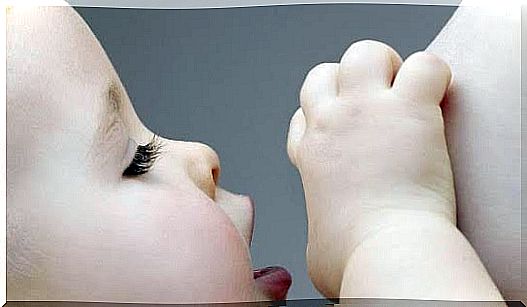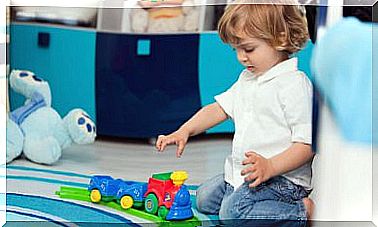Colostrum. What Makes It So Special?

For a baby there is nothing more important than that first contact with his mother, not only because of the need to begin to weave a close bond between them, but also because she is an infinite source of nourishment. Breast milk is synonymous with life, especially because of the powerful colostrum… Let’s find out why it is so incredible.
When you are three to four months pregnant, your body prepares itself and begins to produce this substance in your breasts. Sometimes, you can see how your breasts spill just a few drops of this yellowish liquid (known as precalostrum), before the little one arrives in the world; although if it does not happen, there is no problem.
The body prepares to produce breast milk from the third month
This fluid called colostrum is the first food that the child will eat from your breasts, as soon as it comes out of your tummy. Usually only a small amount comes out, but you don’t have to worry or feel like you will be left hungry. Remember that nature is wise and will produce what he needs to satisfy his requirements.
It must be clarified that it is not a milk as such, it is only a nutritive substance that the mammary glands secrete when the baby is born. Undoubtedly, it is necessary to try to start the Breastfeeding so that he begins to ingest all those nutrients that come from you and grows healthy and strong.
The secrets of colostrum

We know that giving birth is a wonderful act in which you can be exhausted, but none of that will matter when you have the love of your life in your arms asking you to feed him with the melody of his crying. So if you’re not sure how to start the art of breastfeeding, try asking a lactation consultant for help.
The baby needs to take colostrum, as soon as possible, because it is a liquid that has carbohydrates, fats, minerals, vitamins and proteins. These nutrients have the ability to fight disease, stimulating and developing the immune system of your baby.
Colostrum helps prevent infections in the newborn
This maternal sap is produced in the first three or four days, after the birth of your little one. Surely, you will seem that you eat little or that you are left hungry, but ignore those myths of breastfeeding.
You are a volcano of love that is revealed through your breasts and what flows from there is just what that little angel needs that until recently was in your womb. And it is that the volume of colostrum can reach up to 20 milliliters, enough for a newborn.
Now, why is this liquid so special, the forerunner of the breastmilk ? Let’s take a closer look at the reasons:
- For every 100 milliliters, you provide your baby with 54 calories to his body .
- Also, in that same quantity, they hide 2.9 grams of fat, 5.7 grams of lactose and 2.3 grams of protein (triple the milk you will later produce).
- In addition to this, it has immunoglobulin A (IgA) and lactoferrin that help fight infections.
- Provides a high number of macrophages (100,000 / mm3) and infocytes . This protects you against germs, because the digestive system does not destroy cells.
- Oligosaccharides (20 g / L) that help protect from negative environmental agents.
- High concentration of fat-soluble vitamins such as beta-carotene, which gives it a yellowish color.
From the fourth day, mom will start to produce a transition milk that will open the way to mature milk. It is essential that the baby ingest the colostrum, so if you have not been able to get him to feed from your breasts, do not hesitate to use a breast pump to give him a bottle.
The laxative effect of colostrum
One of the most prominent powers of colostrum is the laxative effect it has on the little one. When this substance reaches the baby’s tummy, it stimulates the digestive system to make its first stool, which is known as meconium, made up of dead cells and secretions from the stomach and liver.
Colostrum allows the baby to have his first bowel movement

Once the body manages to dispose of the first stools, the evacuations will depend on each baby. They usually relieve themselves after eating, but they can go up to 72 hours without having a bowel movement; otherwise, consult your pediatrician.
You are a magic nucleus for that baby who has just arrived in the world. Enjoy every second with him and discover how beautiful it is to see him grow up healthy and strong.









